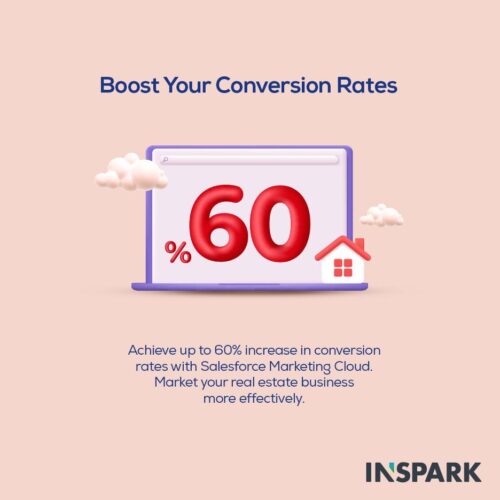
By utilizing Salesforce Marketing Cloud, real estate companies can enhance their marketing efforts, drive engagement, nurture leads effectively, and make data-driven decisions to achieve better results in their marketing campaigns.
- Targeted Marketing Campaigns: Salesforce Marketing Cloud allows real estate companies to create highly targeted marketing campaigns by segmenting their audience based on demographics, interests, behavior, and more. This enables personalized messaging and increases the chances of reaching the right prospects.
- Multi-Channel Engagement: With Salesforce Marketing Cloud, real estate companies can engage with their audience across multiple channels, including email, social media, SMS, and mobile push notifications. This omnichannel approach ensures that potential buyers receive consistent messaging and increases the chances of capturing their attention.
- Automation and Workflow Efficiency: Salesforce Marketing Cloud offers automation capabilities that streamline marketing workflows. Real estate companies can automate repetitive tasks, such as email drip campaigns, lead nurturing, and follow-ups, saving time and effort while maintaining consistent communication with prospects.
- Lead Generation and Nurturing: The platform’s lead generation and nurturing features help real estate companies capture and nurture leads throughout the sales cycle. By utilizing personalized content and targeted messaging, companies can build relationships with prospects, increase engagement, and drive conversions.
- Data-Driven Decision Making: Salesforce Marketing Cloud provides real-time analytics and reporting, allowing real estate companies to gain valuable insights into the performance of their marketing campaigns. By analyzing data on engagement, click-through rates, conversions, and more, companies can make data-driven decisions and optimize their marketing efforts for better results.
- Personalization at Scale: Salesforce Marketing Cloud enables real estate companies to deliver personalized experiences at scale. By leveraging customer data, companies can create dynamic content, personalized recommendations, and tailored messaging, enhancing engagement and building stronger relationships with potential buyers.
- Social Media Advertising: The platform integrates with popular social media channels, such as Facebook, Instagram, and Twitter, allowing real estate companies to run targeted advertising campaigns. This helps expand their reach, increase brand visibility, and generate leads from social media platforms.
- Customer Journey Mapping: Salesforce Marketing Cloud offers tools for mapping out the customer journey, allowing real estate companies to understand and optimize the various touchpoints and interactions prospects have with their brand. This helps create seamless experiences and align marketing efforts with the customer’s needs and preferences.
- Email Marketing Automation: Real estate companies can leverage Salesforce Marketing Cloud’s robust email marketing automation capabilities. They can create personalized email campaigns, automate drip sequences, and track engagement metrics, all while ensuring compliance with email marketing regulations.
- Integration with CRM: Salesforce Marketing Cloud integrates seamlessly with Salesforce CRM, allowing real estate companies to align their marketing and sales efforts. This integration ensures that marketing activities and lead data are synchronized, providing a holistic view of the customer and improving overall efficiency.
- A/B Testing and Optimization: Real estate companies can use Salesforce Marketing Cloud to conduct A/B testing of their marketing campaigns. By testing different messaging, subject lines, calls-to-action, and visuals, companies can identify the most effective strategies and optimize their campaigns for better results.
- Scalability and Customization: Salesforce Marketing Cloud is scalable and customizable, allowing real estate companies to tailor the platform to their specific needs. As the business grows, the platform can accommodate increased data volumes, user requirements, and advanced marketing automation needs.